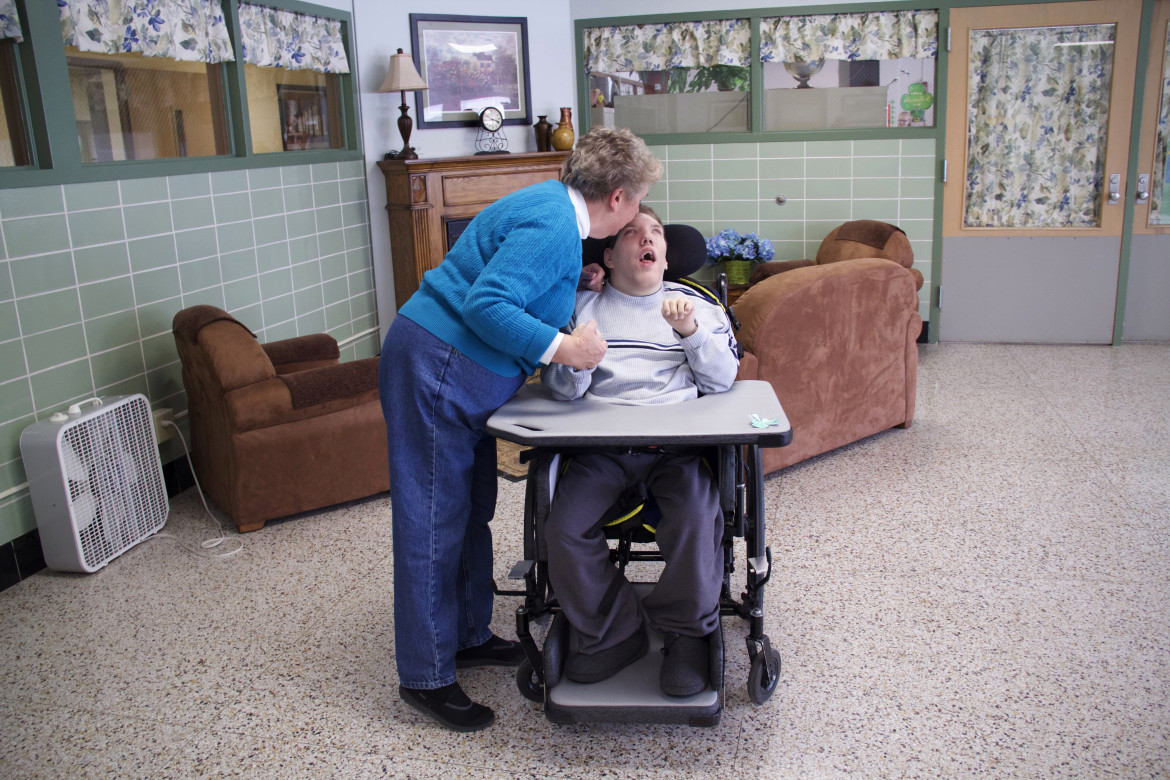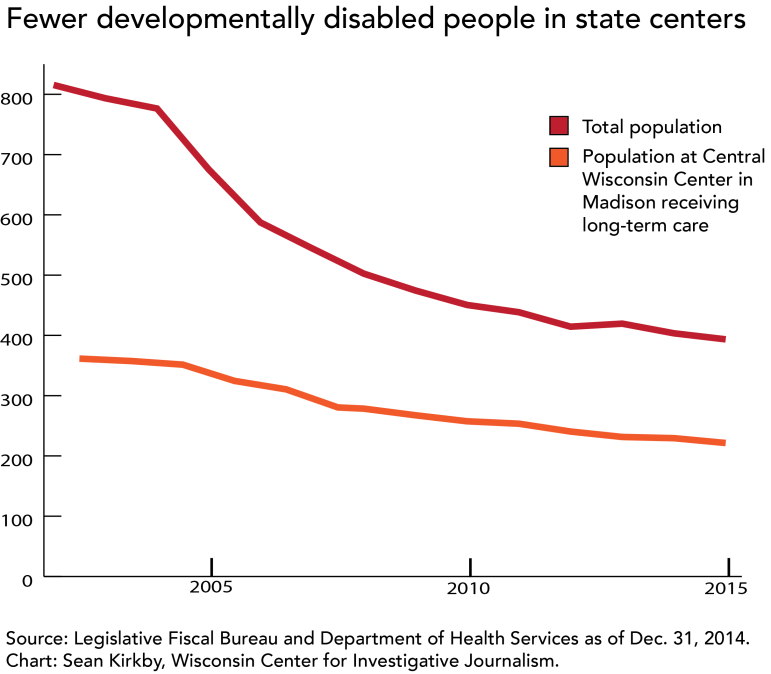State Ending Long-Term Institutional Care for Disabled?
Walker budget continues years-long trend, experts disagree on its impact.

Rebecca Underwood’s son Aaron has lived at Central Wisconsin Center, one of the state’s centers for the developmentally disabled, for more than 30 years. She says the care the center provides its patients and their families “turns their lives around.” Photo Feb. 25, 2015, in Madison. Photo by Kate Golden/Wisconsin Center for Investigative Journalism.
Aaron Underwood’s seizures finally came under control when, at age 3, he was admitted to a state care facility for the developmentally disabled. His mother soon realized the treatment he received there was better than what she and her husband could provide.
“I’m surprised he didn’t die from what I did because I made some stupid mistakes,” said Rebecca Underwood, who lives near the city of Hartford, about 30 miles northwest of Milwaukee.
Aaron, 35, still lives at Central Wisconsin Center in Madison. He is unable to sit up without support. Lacking purposeful movement, he functions at the level of a four- to 12-week-old infant, unable to speak.
The care the facility provides its residents and their families, his mother said, “turns their lives around.”
Only two still provide long-term care – with patients living at the facility for at least six months, and often for years. Neither has admitted new patients in more than 15 years.
The decline is part of a national movement to take people out of institutions and integrate them into the community. But Underwood, who with her husband runs a coalition of family members and advocates for people with intellectual disabilities, worries the trend may have gone too far. In one recent case, a family has gone to court to compel the state to provide long-term institutional care.
On the other hand, some disability rights advocates would like the state to end long-term institutionalization altogether.
“There’s really no reason for people with developmental disabilities to need that level of institutional care,” said Mitch Hagopian, an attorney for Disability Rights Wisconsin, a state advocacy group that is part of a federally mandated network of protection agencies.
“There are sufficient community resources available to provide adequate care for people and in a setting that’s more natural and integrated into the community.”
From long-term to short-term care
Wisconsin’s public state institutions for the developmentally disabled are CWC in Madison, Northern Wisconsin Center in Chippewa Falls, and Southern Wisconsin Center in Union Grove. The facilities are staffed by interdisciplinary teams that include physicians, therapists and nurses.
“They work around the clock and they do an excellent job,” said Dr. Ted Bunck, the former Bureau of Center Operations director at the Wisconsin Department of Health Services. Bunck, who oversaw operations at the state centers until his retirement in January, said the teams individualize care for their residents.
The state’s Medicaid program pays about $3,000 monthly — roughly $100 per day — for a person receiving a nursing home level of care as part of Family Care, one of several long-term programs offered by the state.
For the three state centers, the costs are much higher, ranging from $821 a day at CWC to $1,385 a day at Northern Wisconsin Center. The majority of costs at the state centers are borne by Medicaid, using state and federal dollars.
Family Care cost a total of $1.3 billion for the fiscal year that ended June 30. The total funding for centers during that time was $128.3 million.
Gov. Scott Walker’s biennial budget modifies Family Care, to expand the program statewide and change the way it operates. Advocates for people with disabilities worry the changes could jeopardize the safety of vulnerable participants in the program.
The budget keeps funding about the same for the centers.
CWC last admitted a new patient for long-term care in 1997. Since then, the number of people receiving that level of treatment has decreased from 440 in June of that year to 217 at the end of 2014. Southern Wisconsin Center has seen a similar decline.
Northern Wisconsin Center ended its long-term care program in the mid-2000s, but still provides treatment that lasts from one to three months. Similar programs are offered at the other two state facilities.
“Going forward, the centers’ future mission is really emphasizing short-term, specialized kinds of services,” Bunck said.
-
Legislators Agree on Postpartum Medicaid Expansion
 Jan 22nd, 2025 by Hallie Claflin
Jan 22nd, 2025 by Hallie Claflin
-
Inferior Care Feared As Counties Privatize Nursing Homes
 Dec 15th, 2024 by Addie Costello
Dec 15th, 2024 by Addie Costello
-
Wisconsin Lacks Clear System for Tracking Police Caught Lying
 May 9th, 2024 by Jacob Resneck
May 9th, 2024 by Jacob Resneck






















Well, I am still here to support people with intellectual disabilities. And as part of the community, I am actually in favor of the state’s plan for these individuals. Institutional facilities aren’t fully required to wholly take over for the long term care treatments for patients with developmental conditions. Home care is probably one of the best options.
Ellen S. Mattison
Coolidge Street Maitland, FL 32751